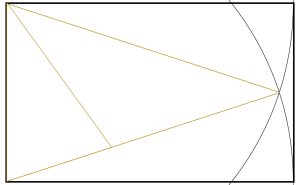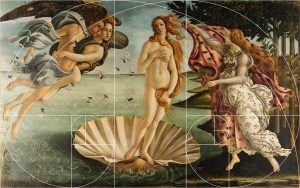We are all familiar with the story of Solomon, a wise king in antiquity who was responsible for the founding of the first temple of Jerusalem. In the King James version of the bible he stands accused of the following:
“And the high places that were before Jerusalem, which were on the right hand of the mount of corruption, which Solomon the king of Israel had builded for Ashtoreth the abomination of the Zidonians, and for Chemosh the abomination of the Moabites, and for Milcom the abomination of the children of Ammon, did the king defile.” –2 Kings 23:13
Who was this ‘abomination’ that he built the first temple for? The name Ashtoreth is another name for the Goddess Astarte. From this we can see that it is accepted that he built the temple for an apparently lost Goddess. The story goes that he ruled justly for 40 years before finally passing away and being buried in Jerusalem. God, apparently, decided that he wanted to punish Israel for the crimes of Solomon thus:
“I am taking the kingdom from him because they have abandoned me and worshiped the Sidonian goddess Astarte, the Moabite god Chemosh, and the Ammonite god Milcom”. – 1. Kings 11:33
Again we see reference to Astarte. God decides to wait until Solomon has passed away before taking his kingdom, apparently in deference to his love for Solomon’s father, David.
“So the Lord said to Solomon, “Because you insist on doing these things and have not kept the covenantal rules I gave you, I will surely tear the kingdom away from you and give it to your servant. However, for your father David’s sake I will not do this while you are alive. I will tear it away from your son’s hand instead. But I will not tear away the entire kingdom; I will leave your son one tribe for my servant David’s sake and for the sake of my chosen city Jerusalem.” – 1 Kings 11:11-13
After this period, his son, Reohboam, loses his kingdom after failing to find wisdom in his counsellors. This is blamed on the hearsay of Solomon.
This is the story as it is recounted to us. However, there is another side to this tale, one we will explore below.
THE SEPTUAGINT
 To understand where the following comes from we first need to study a little history. The Septuagint is an early Greek translation of certain texts now found within the old testament. It is thought to date from around 300-200BC and was written by the Alexandrian Jews.
To understand where the following comes from we first need to study a little history. The Septuagint is an early Greek translation of certain texts now found within the old testament. It is thought to date from around 300-200BC and was written by the Alexandrian Jews.
Specifically we will look at Solomon’s Book Of Wisdom, more specifically, the Brenton translation (with the original Greek), a copy of which can be found here.
These are the supposed words of Solomon regarding how he saw what he was doing as recorded by the Alexandrian Jewish community of that time. This community went on to have a deep cultural impact producing the figures of Philo and Josephus amongst many others.
As you will see, it casts a rather different light on what was happening.
In the following text Solomon addresses Sophia not as a metaphorical concept, but rather as an extension of God’s grace, the ultimate female aspect of the divine. In his words:
“For she is the breath of the power of God, and a pure influence flowing from the glory of the Almighty”
The text strongly echos later Sufi perspectives on the Beloved. As we will see elsewhere in the Bible, there are passages which appear to emphasise this perspective such as Proverbs 8. Modern interpretations of this passage suggest that such a reading is a mistake and a facet of the fact that Sophia is a feminine word and thus it only appears that it is referring to a Goddess.
However, the following text, from before the very earliest days of Christianity suggests something entirely different. This suggests that Solomon wasn’t building a temple to the Goddesses of his wives and concubines, rather he was refocusing the spirituality of his day on the Goddess of Divine Wisdom herself.
THE SOPHIA OF SOLOMON
Wisdom is glorious and never fadeth away: yea, she is easily seen of them that love her, and found of such as seek her.
She preventeth them that desire her, in making herself first known unto them. Whoso seeketh her early shall have no great travail: for he shall find her sitting at his doors. To think therefore upon her is the perfection of wisdom : and whoso watcheth for her shall quickly be without care. For she goeth about seeking such as are worthy of her, sheweth herself facourably unto them in the ways and ineetheth them in every thought. For the very true beginning of her is the desire of discipline; and the care of discipline is love; and love is the keeping of her laws; and the giving heed unto her laws is the assurance of incorruption; and incorruption maketh us near unto God: therefore the desire of wisdom bringeth to a kingdom.
If your delight be then in thrones and sceptres, O ye kings of the people, honour wisdom, that ye may reign for evermore. As for wisdom, what she is, and how she came up, I will tell you, and will not hide mysteries from you: but will seek her out from the beginning of her nativity, and bring the knowledge of her into light, and will not pass over the truth. Neither will I go with consuming envy; for such a man shall have no fellowship with wisdom. But the multitude of the wise is the welfare of the world: and a wise king is the upholding of the people. Receive therefore instruction through my words, and it shall do you good.
I myself am a mortal man, like to all and the offspring of him that was first made of the earth, and in my mother’s womb was fashioned to be flesh in the time of ten months, being compacted in blood, of the seed of man and the pleasure that came with sleep. And when I was born, I drew in the common air, and fell upon the earth, which is of like nature and the first voice which I uttered was crying as all others do. I was nursed in swaddling clothes, and that with cares. For there is no king that has any other beginning of birth. For all men have one entrance into life, and the like going out.
Wherefore I prayed and understanding was given me: I called upon God and the spirit of wisdom came to me. I preferred her before sceptres and thrones, and esteemed riches nothing in comparison of her. Neither compared I unto her any precious stone, because all gold in respect of her is as a little sand, and silver shall be counted as clay before her. I loved her above health and beauty, and chose to have her instead of light: for the light that cometh from her never goeth out.
All good things together came to me with her, and innumerable riches in her hands. And I rejoiced in them all, because wisdom goeth before them : and I knew not that she was the mother of them.
I learned diligently, and do communicate her liberally : I do not hide her riches. For she is a treasure unto men that never faileth : which they that use become the friends of God, being commended for the gifts that come from learning.
God hath granted me to speak as I would and to conceive as is meet for the things that are given me: because it is he that leadeth unto wisdom, and directeth the wise. For in his hand are both we and our words; all wisdom also, and knowledge of workmanship. For he hath given me certain knowledge of the things that are, namely, to know how the world was made and the operations of the elements: the alterations of the turning of the sun, and change of seasons: the circuits of years, and the positions of stars : the natures of living creatures, and the furies of wild beasts : the violence of winds, the reasonings of men : the diversities of plants and the virtues of roots: and all such things as are either secret or manifest, them I know.
For wisdom, which is the worker of all things, taught me : for in her is an understanding spirit, holy, one only, manifold, subtil, lively, clear, undefiled, plain, not subject to hurt, loving the thing what is good, quick, which cannot be letted ready to do good, kind to man, stedfast, sure, free from care, having all power, overseeing all things, and going through all understanding, pure and most subtil, spirits.
For wisdom is more moving than any motion: she passeth and goeth through all things by reason of her pureness. For she is the breath of the power of God, and a pure influence flowing from the glory of the Almighty: therefore can no defiled thing fall into her. For she is the brightness of the everlasting light, the unspotted mirror of the power of God, and the image of his goodness. And being but one, she can do all things : and remaining in herself, she maketh all things new: and in all ages entering into holy souls, she maketh them friends of God, and prophets.
For God loveth none but him that dwelleth with wisdom. For she is more beautiful than the sun and above all the order of stars: being compared with the light, she is found before it. For after this cometh night: but vice shall not prevail against wisdom.
Wisdom reacheth from one end to another mightily; and sweetly doth she order all things.
I loved her, and sought her out from my youth, I desired to make her my spouse, and I was a lover of her beauty. In that she is conversant with God, she manifieth her nobility: yea, the Lord, of all things himself loved her. For she is privy to the mysteries of the knowledge of God, and the lover of his works.
If riches be a possession to be desired in this life; what is richer than wisdom, that worketh all things? And if prudence work; who of all that is a more cunning workman than she? And if a man love righteousness, her labours are virtues: for she teacheth temperance and prudence, justice and fortitude: which are such things, as men can have nothing more profitable in their life. If a man desire much experience, she knoweth things of old, and conjectureth alright what is to come: she knoweth the subtilties of speeches and can expound dark sentences: she foreseeth signs and wonders, and the events of the seasons and times.
Therefore I purposed to take her to me to live with me, knowing that she would be a counsellor of good things, and a comfort in cares and grief. For her sake I shall have estimation among the multitude, and honour with the elders, through I be young. I shall be found of a quick conceit in judgement, and shall be admired in the sight of great men. When I hold my tongue, they shall bide my leisure, and when I speak, they shall give good ear unto me: if I talk much, they shall lay their hands upon their mouth.
Moreover by the means of her I shall obtain immortality, and leave behind me an everlasting memorial to them that come after me. I shall set the people in order and the nations shall be subject unto me. Horrible tyrants shall be afraid when they do but hear of me; I shall be found good among the multitude and valiant in war. After I am come into mine house, I will repose myself with her: for her conversation hath no bitterness: and to live with her hath no sorrow but mirth and joy.
Now when I considered these things in myself and pondered them in my heart, how that to be allied unto wisdom is immortality: and great pleasure it is to have her friendship; and in the works of her hands are infinite riches; and in the exercise of conference with her, prudence; and in talking with her, a good report; I went about seeing how to take her to me.
For I was a witty child, and had a good spirit. Yea rather, being good, I came into a body undefiled. Nevertheless, when I perceived that I could not otherwise obtain her, except God gave her me; and that was a point of wisdom also to know whose gift she was; I prayed unto the Lord, and besought him and with my who heart I said,
“O god of my fathers, and Lord of mercy, who hast made all things with thy word, and ordained man through thy wisdom, that he should have dominion over the creatures which thou hast made, and order the world according to equity and righteousness, and execute judgement with an upright heart: give me wisdom, that sitteth by thy throne; and reject me not from among thy children: for I thy servant and son of thine handmaid am a feeble person, and of a short time and too young for the understanding of judgement and laws.
For though a man be never so perfect among the children of men, yet if thy wisdom be not with him, he shall be nothing regarded.
Thou hast chosen me to be a king of thy people, and a judge of thy sons and daughters: thou hast commanded me to build a temple upon thy holy mount, and an alter in the city wherein thou dwellest, a resemblance of the holy tabernacle, which thou hast prepared from the beginning. And wisdom was with thee: which knoweth thy works, and was present when thou madest the world, and knew what was acceptable in thy sight, and right in they commandments. O send her out of they holy heavens and from the throne of they glory, that being present she may labour with me, that I may know what is peleasing unto thee. For she knoweth and understaneth all things, and she shall lead me soberly in my doings, and preserve me in her power. So shall my works be acceptable, and be worthy to sit in my father’s seat.
For what man is he that can know the counsel of God? or who can think what the will of the Lord is? For the thoughts of mortal men are miserable, and our devices are but uncertain. For the corruptible body presseth down the soul, and the earthy tabernacle weigheth down the mind that museth upon many things. And hardly do we guess aright at things that are upon earth, and with labour do we find the things that are before us: but the things that are in heaven who hath searched out? And they counsel who hath known, except thou give wisdom, and send thy Holy Spirit from above? For so the ways of them which lived on the earth were reformed, and men were taught the things that are pleasing unto thee, and were saved through wisdom.
She preserved the first formed father of the world that was created alone, and brought him out of his fall, and gave him power to rule all things.
DISCUSSION
We will find that this text has been hugely important historically can can be seen echoed in later words by Sufi, Orthodox Christian and Medieval writers. It also gives some insight into how the Bible of the early Christians differed from the ones we have today. This text served as a inspiration for many hidden traditions that were to come later within the Abrahamic world.
However, we must look far further back into the pagan past to find the roots of this Wisdom tradition.
I am no fan of the modern Bible. I find it poorly written, translated and edited. Large segments are also copied from far earlier and wiser cultures, often with a failure to transmit the important aspects of such stories. However, if the above is a true representation of the words of Solomon, I would argue that he was far more wise than the Bible gave him credit.
It is also interesting to reflect on the similarities between this Goddess and the one found in the poem The Thunder, Perfect Mind (also known as the Prayer of Sophia), found as part of the Gnostic Nag Hammadi library and thought to date from prior to 350AD. It may also have originated in Alexandria, suggesting, perhaps, some continuity between the two.
I have already posted the full text with a recording of its reading here.




